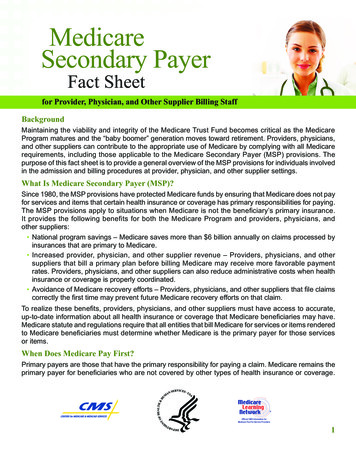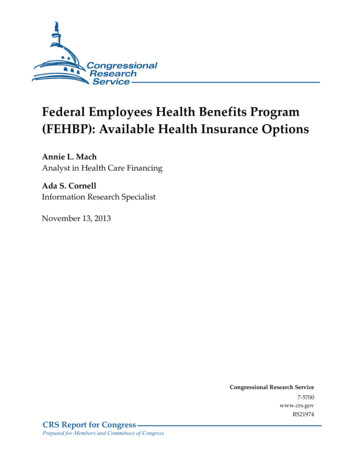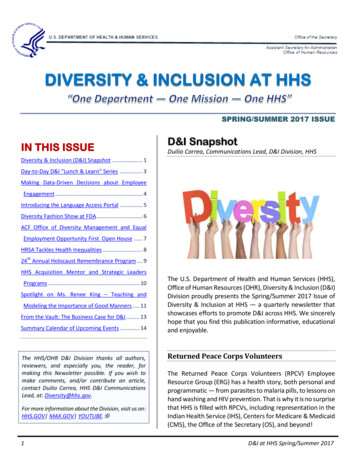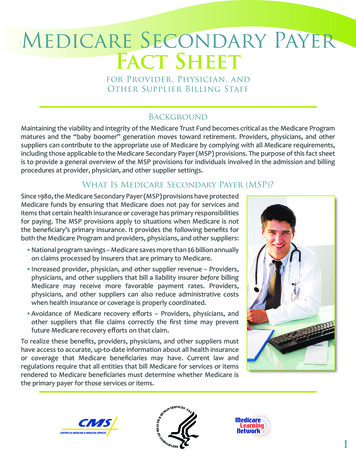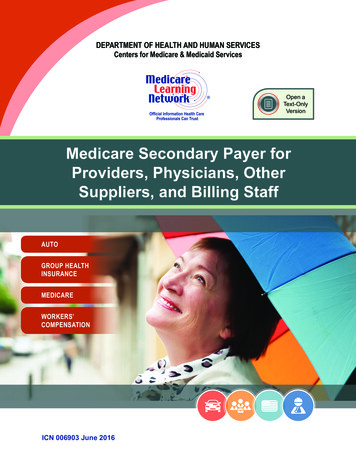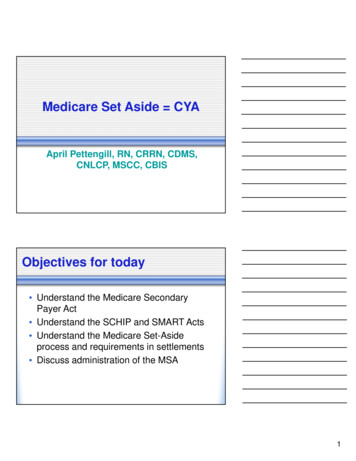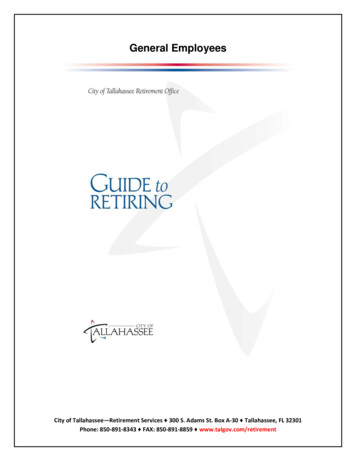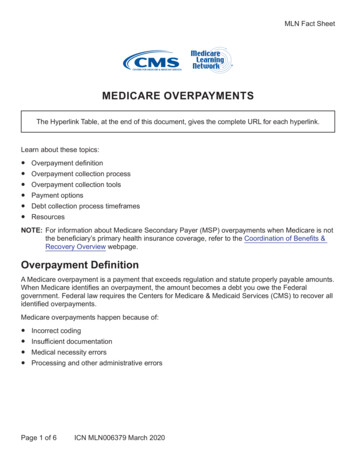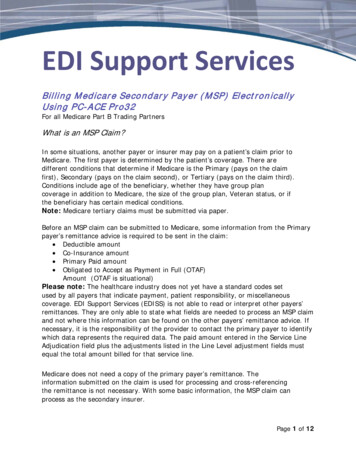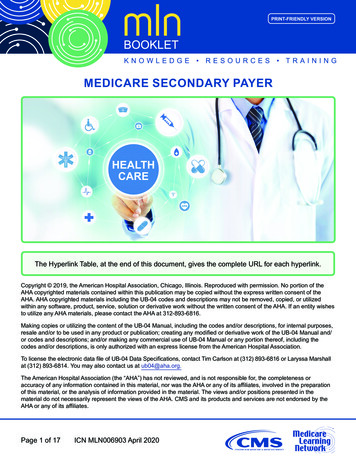
Transcription
PRINT-FRIENDLY VERSIONMEDICARE SECONDARY PAYERThe Hyperlink Table, at the end of this document, gives the complete URL for each hyperlink.Copyright 2019, the American Hospital Association, Chicago, Illinois. Reproduced with permission. No portion of theAHA copyrighted materials contained within this publication may be copied without the express written consent of theAHA. AHA copyrighted materials including the UB-04 codes and descriptions may not be removed, copied, or utilizedwithin any software, product, service, solution or derivative work without the written consent of the AHA. If an entity wishesto utilize any AHA materials, please contact the AHA at 312-893-6816.Making copies or utilizing the content of the UB-04 Manual, including the codes and/or descriptions, for internal purposes,resale and/or to be used in any product or publication; creating any modified or derivative work of the UB-04 Manual and/or codes and descriptions; and/or making any commercial use of UB-04 Manual or any portion thereof, including thecodes and/or descriptions, is only authorized with an express license from the American Hospital Association.To license the electronic data file of UB-04 Data Specifications, contact Tim Carlson at (312) 893-6816 or Laryssa Marshallat (312) 893-6814. You may also contact us at ub04@aha.org.The American Hospital Association (the “AHA”) has not reviewed, and is not responsible for, the completeness oraccuracy of any information contained in this material, nor was the AHA or any of its affiliates, involved in the preparationof this material, or the analysis of information provided in the material. The views and/or positions presented in thematerial do not necessarily represent the views of the AHA. CMS and its products and services are not endorsed by theAHA or any of its affiliates.Page 1 of 17ICN MLN006903 April 2020
Medicare Secondary PayerMLN BookletTABLE OF CONTENTSWhat Is MSP?. 3When Does Medicare Pay First?. 3Are There Exceptions to the MSP Provisions?. 8What Happens if the Primary Payer Denies a Claim? . 8When May Medicare Make a Conditional Payment? . 9How Is Beneficiary Health Insurance or Coverage Information Collected and Coordinated?. 10What Are Your Responsibilities Under the MSP Provisions?. 12How Do You Gather Accurate MSP Data From the Beneficiary?. 13What Happens if You Submit a Claim to Your MAC Without Adding the OtherInsurer’s Information?. 14What Happens if You Fail to File Correct and Accurate Claims?. 14Who Do You Contact With MSP Questions? . 15Resources. 16Page 2 of 17ICN MLN006903 April 2020
Medicare Secondary PayerMLN BookletThe Medicare Secondary Payer (MSP) provisions protect the Medicare Trust Fund. This booklet givesan overview of the MSP provisions and explains your responsibilities.WHAT IS MSP?MSP provisions prevent Medicare from paying for items and services when other health insurancecoverage is primary. In these cases, the MSP program contributes to the following: National program savings: The Centers for Medicare &Medicaid Services (CMS) enforcement of MSP provisionsStay Up to Datesaved the Medicare Program approximately 8.5 billion inTo sign up for automatic updates,Fiscal Year (FY) 2018.enter your email address in the Increased provider, physician, and other supplier“Receive Email Updates” box atrevenue: Billing a primary plan before Medicare maythe bottom of the Coordination ofprovide you with better reimbursement rates. Also,Benefits & Recovery (COB&R)coordinated health coverage may expedite the paymentOverview webpage.process and reduce administrative costs. Avoidance of Medicare recovery efforts: Filing claimscorrectly the first time prevents future Medicare recovery efforts on claims.To receive these benefits it is important to ask and/or access accurate, up-to-date information aboutyour Medicare beneficiary’s health insurance coverage. Medicare regulations require providers whosubmit Medicare claims to determine whether Medicare is the primary payer or secondary payer foritems or services furnished to a beneficiary.WHEN DOES MEDICARE PAY FIRST?Primary payers must pay a claim first. Medicare pays first for beneficiaries in the absence ofother primary insurance or coverage. Medicare may also pay first when the beneficiary has otherinsurance coverage.Table 1 lists some common situations when a beneficiary has both Medicare and other health plancoverage and which entity pays first (primary payer) and which entity pays second (secondary payer).Page 3 of 17ICN MLN006903 April 2020
Medicare Secondary PayerMLN BookletTable 1. Analysis of Common MSP Coverage SituationsIndividualConditionIs 65 or older, and coveredby a Group Health Plan(GHP*) through currentemployment or spouse’scurrent employmentThe individual is entitledto Medicare.Is 65 or older, and coveredby a GHP through currentemployment or spouse’scurrent employmentThe individual is entitledto Medicare.Is 65 or older, has anemployer retirement GHP,and is not workingIs under 65, disabled, andcovered by a GHP throughtheir current employment orthrough a family member’scurrent employmentIs under 65, disabled, andcovered by a GHP throughtheir current employment orthrough a family member’scurrent employmentPage 4 of 17The employer has lessthan 20 employees.The employer has 20or more employeesor is part of a multipleor multi-employergroup with at least oneemployer employing 20or more individuals.Pays FirstPays SecondMedicareGHPGHPMedicareMedicareRetiree CoverageMedicareGHPGHPMedicareThe individual is entitledto Medicare.The individual is entitledto Medicare.The employer has lessthan 100 employees.The individual is entitledto Medicare.The employer has 100or more employees oris part of a multiple ormulti-employer group withat least one employeremploying 100 or moreindividuals.ICN MLN006903 April 2020
Medicare Secondary PayerMLN BookletTable 1. Analysis of Common MSP Coverage Situations (cont.)IndividualConditionHas End-Stage RenalDisease (ESRD) and GHPcoverage was the primaryplan prior to the individualbecoming eligible andentitled to Medicare basedon ESRDFirst 30 months ofMedicare eligibilityor entitlement.Has ESRD and GHPcoverageAfter 30 months ofMedicare eligibilityor entitlement.Has ESRD andConsolidated OmnibusBudget Reconciliation Actof 1985 (COBRA) coverageprior to becoming eligible orentitled to MedicareFirst 30 months ofMedicare eligibilityor entitlement.Has ESRD and COBRAcoverageAfter 30 months ofMedicare eligibilityor entitlement.Is covered under Workers’Compensation (WC)because of a job-relatedillness or injuryThe individual is entitledto Medicare.Pays FirstPays OBRAWC pays first forhealth care items orservices related tojob-related illnessor injury. See WhenMay MedicareMake a ConditionalPayment? section.Workers’CompensationPage 5 of 17ICN MLN006903 April 2020Medicare
Medicare Secondary PayerMLN BookletTable 1. Analysis of Common MSP Coverage Situations (cont.)IndividualConditionPays FirstWas in an accident or otherincident where no-fault orliability insurance is involvedThe individual is entitledto Medicare.No-fault or liabilityinsurance paysfirst for accident- orother incidentrelated health careservices. See WhenMay MedicareMake a ConditionalPayment? section.WC, Liability, orNo-Fault pays firstwhen ongoingresponsibility formedicals (ORM) isreported. Medicaredoes not make apayment.Pays SecondMedicareNOTE: For ORM,Medicare does notmake a paymentuntil ORM fundsare exhausted.AccidentIs 65 or older, or is disabledand covered by Medicareand COBRADual eligible beneficiaryregardless of reason foreligibilityPage 6 of 17The individual is entitledto Medicare.MedicareCOBRAMedicareMedicaidThe individual is entitledto both Medicare andMedicaid.ICN MLN006903 April 2020
Medicare Secondary PayerMLN BookletTable 1. Analysis of Common MSP Coverage Situations (cont.)IndividualConditionCovered by Medicare andhas a Medigap or Medicaresupplemental planThe individual is entitledto Medicare.Active duty statusmilitary memberInactive status militarymember treated bycivilian providersInactive status militarymember treated at a militaryhospital or by otherFederal providersPays FirstPays AREMedicareMedicareTRICARETRICAREMedicareThe individual is entitledto Medicare andTRICARE.The individual is entitledto Medicare andTRICARE.The individual is entitledto Medicare andTRICARE.* A GHP is any arrangement of, or contribution from, one or more employers or employee organizations toprovide insurance to current or former employees or their families.For more education on how Medicare works with other government payers, take the MedicareLearning Network (MLN) Web-Based Training course “Medicare Secondary Payer Provisions.”Page 7 of 17ICN MLN006903 April 2020
Medicare Secondary PayerMLN BookletARE THERE EXCEPTIONS TO THE MSP PROVISIONS?There are no exceptions to the MSP provisions. Federal law (Social Security Act (SSA) § 1862(b))establishes the payment order and takes precedence over State laws and private contracts. Medicarecannot make payment if payment has been already made, or can reasonably be expected to be madeby another payer. Even if an entity believes it is the secondary payer to Medicare, due to State law orthe contents of an insurance policy, the MSP provisions apply when billing for services.WHAT HAPPENS IF THE PRIMARY PAYER DENIES A CLAIM?In the following situations, Medicare may make payment, assuming the service is Medicare-coveredand payable and the provider files a proper claim: A no-fault or liability insurer does not pay during the “paid promptly” period or denies the medical bill A WC program does not pay during the “paid promptly” period or denies payment (for example,when WC excludes a medical condition or certain services) The beneficiary received services not directly related to the condition for which he or she isreceiving WC benefits Workers’ Compensation Medicare Set-Aside Arrangement (WCMSA) or the ORM benefitsterminate or exhaust A GHP denies payment for services because:1. The beneficiary exhausted plan benefits for certain services2. The beneficiary is not entitled to benefits under the GHP3. The beneficiary needs services not covered by the GHPWhen submitting a primary claim to Medicare, include information identifying why the other payerdenied the claim, made an exhausted benefits determination, or another reason that may apply.Page 8 of 17ICN MLN006903 April 2020
Medicare Secondary PayerMLN BookletWHEN MAY MEDICARE MAKE A CONDITIONAL PAYMENT?Frequently, there is a long delay between an injury and the decision by the primary payer in a contestedcompensation case. Medicare may make conditional payments on a pending case to avoid imposinga financial hardship on you and the beneficiary while awaiting a decision in a contested case.Medicare can make conditional payments on behalf of beneficiaries for Medicare-covered serviceseven if it is not the primary payer. Medicare may make conditional payments for covered services inliability (including self-insurance), no-fault, and WC situations, if both the following are true: Liability (including self-insurance), no-fault, or WC insurer is responsible for payment The claim is not expected to be paid promptlyMedicare has the right to recover any conditional payments. The Benefits Coordination & RecoveryCenter (BCRC) recovers conditional payments from the Medicare beneficiary or their attorney whenthe beneficiary gets a settlement, judgment, award, or other payment.Medicare may pay conditional primary benefits if the provider, physician, supplier, or beneficiary failto file a proper claim with the GHP (or Large Group Health Plan [LGHP]) due to physical or mentalincapacity of the beneficiary.If there is a primary GHP and the provider does not bill the GHP first, Medicare may not payconditionally on the liability (including self-insurance), no-fault, or WC claim. Providers must bill theGHP before billing Medicare, and the primary payer payment information that appears on all primarypayer remittance advices must appear on the claim submitted to Medicare. Medicare will not payconditional primary benefits in other situations where: The GHP says it is secondary to Medicare The GHP limits its payment when the individual is entitled to Medicare The GHP covers the services for younger employees and spouses, but not for employees andspouses age 65 and older The GHP says it is secondary to liability, no-fault, or WC insuranceAdditionally, Medicare will not make conditional payments associated with WCMSAs or when theORM exists.“Paid Promptly” DefinitionFor no-fault insurance and WC claims, “paid promptly” means payment within 120 days after theno-fault insurance or WC carrier got the claim for specific items and services. Without contradictinginformation, the date of service for specific items and services must be treated as the claim date whendetermining the “paid promptly” period; for inpatient services, the date of discharge must be treatedas the date of service.Page 9 of 17ICN MLN006903 April 2020
Medicare Secondary PayerMLN BookletFor liability insurance (including self-insurance), “paid promptly” means payment within 120 days afterwhichever of the following occurs first: The date a general liability claim is filed with an insurer or a lien is filed against a potentialliability settlement The date the service was furnished or, in the case of inpatient services, the date of dischargeFor more information on conditional payments, refer to the following sections of the MedicareSecondary Payer Manual: Chapter 1, Section 10.7 Chapter 3, Sections 30 and 40 Chapter 5, Section 40 Chapter 6, Sections 40.3 and 60A Non-Group Health Plan (NGHP) is coverage from a liability insurer (including self-insurance),no-fault insurer, and WC carrier. Submit all NGHP claims to the appropriate NGHP insurer beforesubmitting to Medicare. For more information and instructions on submitting a claim for conditionalpayment, refer to the MLN Matters article on Clarification of Medicare Conditional Payment Policy.Ongoing Responsibility for Medicals (ORM)Medicare cannot make payment when payment “has been made, or can reasonably be expected tobe made” under liability insurance (including self-insurance), no-fault insurance, or a WC law or plan,also referred to as a primary plan.When a primary plan reports the existence of ORM to Medicare, it assumes responsibility to pay, on anongoing basis, for certain medical care related to the accident or injury. Medicare cannot make paymentrelated to this injury without documentation that the ORM has terminated or is otherwise exhausted.HOW IS BENEFICIARY HEALTH INSURANCE OR COVERAGEINFORMATION COLLECTED AND COORDINATED?Coordination of Benefits (COB) allows plans that cover Medicare beneficiaries to determine theirpayment responsibilities. The BCRC collects, manages, and uploads information to the CommonWorking File (CWF) about Medicare beneficiaries’ other health insurance coverage. Providers,physicians, and other suppliers must collect accurate MSP beneficiary information for theBCRC to coordinate the information.Page 10 of 17ICN MLN006903 April 2020
Medicare Secondary PayerMLN BookletBCRC relies on health insurance maintained by stakeholders, including Federal and State Programs;plans that offer health insurance, prescription coverage, or both; pharmacy networks; and a varietyof assistance programs. Some of the reporting methods for Medicare to obtain MSP and COBinformation includes: Voluntary Data Sharing Agreement (VDSA): The VDSA allows CMS and an employer toelectronically exchange GHP eligibility and Medicare information. The VDSA includes MedicarePart D information, enabling VDSA partners to submit primary or secondary records withprescription drug coverage to Part D. MSP Mandatory Reporting Process: There are mandatory MSP reporting requirements forGHP and NGHP insurance arrangements, including liability insurance (including self-insurance),no-fault insurance, and WC to report beneficiary MSP information. For more information, refer toMandatory Insurer Reporting for GHPs or Mandatory Insurer Reporting for NGHPs. MSP Claims Investigation: The BCRC investigates when it learns another insurance plan mayhave primary responsibility for paying the beneficiary’s Medicare claims. The BCRC determinesif information is missing from MSP records or MSP cases. Single-source investigations offer acentralized location for MSP-related inquiries. Investigations involve collecting data on otherhealth insurance or coverage that may be primary to Medicare based on information submittedon a medical claim or from other sources, such as correspondence, accident and injury cases, orphone calls. Electronic Correspondence Referral System (ECRS): ECRS is a web-based application thatallows Medicare contractor representatives and CMS Regional Office MSP staff to electronicallytransmit MSP information to the BCRC.For more information on the BCRC, refer to the Medicare Secondary Payer Manual, Chapter 4.Page 11 of 17ICN MLN006903 April 2020
Medicare Secondary PayerMLN BookletWHAT ARE YOUR RESPONSIBILITIES UNDERTHE MSP PROVISIONS?Part A Institutional Providers (Hospitals)Using the MSP Questionnaire during the admissionprocess, gather accurate MSP data to determine ifMedicare is the primary payer by asking Medicarebeneficiaries, or their representatives.Bill the primary payer before billing Medicare.Submit any MSP information on your Medicare claimusing proper payment information, value codes,condition and occurrence codes, etc. (If submitting anelectronic claim, include the necessary fields, loops,and segments for Medicare MSP claims processing.)Part B Providers (Physicians, Practitioners, and Suppliers)Gather accurate MSP data to determine ifMedicare is the primary payer by asking Medicarebeneficiaries, or their representatives, forMSP information.Bill the primary payer before billing Medicare.Submit an Explanation of Benefits (EOB), orremittance advice, from the primary payer withyour Medicare claim, with all appropriate MSPinformation. (If submitting an electronic claim,include the necessary fields, loops, and segmentsfor Medicare MSP claims processing.)Medicare timely filing requirements apply for Medicare-covered services. For more information, referto the Medicare Claims Processing Manual, Chapter 1, Section 70.Page 12 of 17ICN MLN006903 April 2020
Medicare Secondary PayerMLN BookletHOW DO YOU GATHER ACCURATE MSP DATA FROMTHE BENEFICIARY?As a Medicare provider, you must determine whether Medicare is the primary or secondary payerfor each inpatient admission or outpatient encounter before submitting a Medicare claim. You can dothis by asking Medicare beneficiaries about other coverage. The questions you ask help update thebeneficiary insurance information and verify that the beneficiary’s record, found in the CWF, is correctand up to date.CMS developed tools, including an MSP model questionnaire, Admissions Questions to Ask MedicareBeneficiaries, to help providers identify the correct primary claims payers for all beneficiary-furnishedservices in a hospital. Additionally, there are CMS electronic tools that help identify and verify MSPsituations. Refer to the MSP Questionnaire and the various CMS electronic tools in the MedicareSecondary Payer Manual, Chapter 3, Section 20. Your Medicare Administrative Contractor (MAC)may also offer questionnaire tools. For more information, refer to the Contact your MAC webpage.Providers are required to retain copies of completed MSP Questionnaires and other MSP informationfor 10 years after the date of service. You may keep hard copy files, optical images, microfilms, ormicrofiches. When storing these files online, keep both negative and positive responses to questions.BCRC Claims InvestigationIf you do not give Medicare records of other health insurance or coverage that may be primary toMedicare on any claim and there is an indication of possible MSP considerations, the BCRC mayrequest the beneficiary, employer, insurer, or attorney complete a Secondary Claim Development(SCD) Questionnaire. The BCRC may send an SCD Questionnaire when: The MAC receives a claim with an EOB or remittance advice attached from an insurer otherthan Medicare The MAC receives an electronic claim with other insurance payment information in the appropriateloops and segments The beneficiary self-reports or beneficiary’s attorney identifies an MSP situation The third-party payer submitted MSP information to a MAC or the BCRCFor more information on Secondary Claim Development, refer to CMS’ Reporting Other HealthInsurance webpage.Page 13 of 17ICN MLN006903 April 2020
Medicare Secondary PayerMLN BookletWHAT HAPPENS IF YOU SUBMIT A CLAIM TO YOUR MACWITHOUT ADDING THE OTHER INSURER’S INFORMATION?Medicare may mistakenly pay a claim as primary if it meets all billing requirements, includingcoverage and medical necessity guidelines. However, if the beneficiary’s MSP record in the CWFshows another insurer should have paid primary to Medicare, Medicare denies the claim.If the MAC does not have enough information on the claim or correspondence, it may forward theinformation to the BCRC, and the BCRC may send the beneficiary, employer, insurer, or an attorneythe SCD Questionnaire for additional information. The BCRC reviews the response information on thequestionnaire and takes appropriate action.For more information on proper MSP billing, refer to the Medicare Secondary Payer Manual, Chapter 3.WHAT HAPPENS IF YOU FAIL TO FILE CORRECT ANDACCURATE CLAIMS?File proper and timely claims with the appropriate primary payer. Not filing proper and timely claimswith the appropriate primary payer may result in claim denial by that payer. Policies vary dependingon the payer; check with the payer to learn about its specific policies.Federal law allows Medicare to recover improper payments. Medicare requires the return of anypayment made in error as the primary payer. Generally, for MSP GHP situations, Medicare recoversmistaken payments. Medicare can also fine providers, physicians, and other suppliers for knowingly,willfully, and repeatedly giving inaccurate health insurance information.Page 14 of 17ICN MLN006903 April 2020
Medicare Secondary PayerMLN BookletWHO DO YOU CONTACT WITH MSP QUESTIONS?Table 2 gives information about who to contact for specific MSP related questions or situations.Table 2. Who to Contact for MSP QuestionsContactBCRC Customer ServiceRepresentativesMonday through Friday(except holidays)8 am to 8 pm, ETQuestion Questions about Medicare development letters andquestionnaires Report a beneficiary’s accident/injury Report changes to a beneficiary’s employment or healthinsurance coverage Report potential MSP situations Verify Medicare’s primary/secondary status Contact Medicare’s Commercial Recovery Center (CRC)Toll free lines:1-855-798-2627Text Telephone (TTY) orTelecommunication Devicefor the Deaf (TDD)1-855-797-2627 for thehearing and speech impairedMACFind your MAC’s websiteat http://go.cms.gov/MACwebsite-list.For guidance on reporting changes to a beneficiary’s health coverage,refer to the MLN Matters article on Updating Beneficiary Information.Request MSP information from the beneficiary before billing. Toprotect the rights and information of our beneficiaries, the BCRCcannot disclose this information. Questions about Medicare claim or service denials and adjustments Questions about how to bill Questions about the processing of a specific claim Returning inappropriate Medicare payments Voluntary refundsFor information about specific mailing addresses within the BCRC and CRC, refer to theBCRC contacts webpage.The CRC is responsible for GHP recoveries and handles activities related to recovering thoseimproper payments. BCRC is responsible for liability, no-fault, and WC recoveries. The CRC andBCRC manage all Coordination of Benefits & Recovery (COB&R) activities with two exceptions: Recovery demand letters issued by the MSP Recovery Auditors under the demonstrationauthorized by the Medicare Modernization Act of 2003 MSP recovery demand letters issued by MACs to providers, physicians, and other suppliersPage 15 of 17ICN MLN006903 April 2020
Medicare Secondary PayerMLN BookletRESOURCESTable 3. ResourcesResourceWebsiteCMS MSP y-PayerMedicare & Other HealthBenefits: Your Guide toWho Pays FirstMLN Matters ArticleSE1217 Guidance forCorrect Claims SubmissionWhen Secondary PayersAre InvolvedMLN Matters Article SE17018Billing in Medicare SecondaryPayer (MSP) LiabilityInsurance cles/downloads/SE17018.pdfTable 4. Hyperlink TableEmbedded HyperlinkComplete URLCoordination of Benefits& Recovery efits-and-Recovery-Overview/OverviewMedicare LearningNetwork (MLN)Web-Based TrainingSocial Security Act (SSA) §1862(b)Medicare Secondary sedTrainingClarification of MedicareConditional Payment nloads/MM7355.pdfPage 16 of 17https://www.ssa.gov/OP ly-Manuals-IOMs-Items/CMS019017ICN MLN006903 April 2020
Medicare Secondary PayerMLN BookletTable 4. Hyperlink Table (cont.)Embedded HyperlinkComplete URLMandatory Insurer Reportingfor r-Group-Health-Plans/OverviewMandatory Insurer Reportingfor or-Non-Group-HealthPlans/OverviewMedicare Secondary PayerManual, Chapter ance/Manuals/Downloads/msp105c04.pdfMedicare Claims ProcessingManual, Chapter ance/Manuals/Downloads/clm104c01.pdfAdmission Questions to AskMedicare age 16Medicare Secondary PayerManual, Chapter ance/Manuals/Downloads/msp105c03.pdfContact Your MAChttp://go.cms.gov/MAC-website-listReporting OtherHealth nsuranceUpdating tersArticles/Downloads/SE1416.pdfBCRC e Learning Network Content Disclaimer, Product Disclaimer, and Department of Health & Human Services DisclosureThe Medicare Learning Network , MLN Connects , and MLN Matters are registered trademarks of the U.S. Departmentof Health & Human Services (HHS).Page 17 of 17ICN MLN006903 April 2020
The Medicare Secondary Payer (MSP) provisions protect the Medicare Trust Fund. This booklet gives . an overview of the MSP provisions and explains your responsibilities. WHAT IS MSP? MSP provisions prevent Medicare from paying for items and services when other health insurance coverage is primary.
